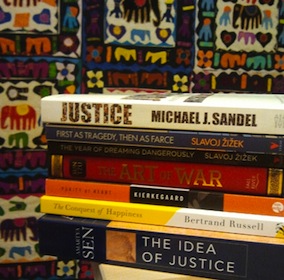LETTERS FROM THE GLOBAL PROVINCE
 Bookies, Global Province Letter, 9 October 2013
Bookies, Global Province Letter, 9 October 2013
I love St. John’s College (full disclosure: I received my Masters from the school in 2002). As a lover, it fits my needs perfectly: a deep listener, a keen learner, respectful, patient, tolerant, seeking out the greatest works and biggest questions, and, yes, ironic. You need irony to be my lover and to be “the great books school.”
The tenor and direction of most academic institutions, like the tenor and direction of our mass culture, like the tenor and direction of most lovers, is away from big questions towards smaller, niche, ephemera. Swimming against that tide seems peculiar, even absurd, not to mention “impractical.” But, like St. John’s, I embrace that strangeness (like an Irish monk studiously copying the great works of western civilization as the barbarians knocked at the gate, except I am lousy at Latin and Greek).----James Marshall Crotty in Forbes.
Hiring Whole People. We were put to the test recently when we decided to do over all our computer systems. We had last done a massive changeover around 2000, so the engine, the brakes, and everything else on our string of computer desktops were huffing and puffing and not getting us anywhere fast. Buying a whole bunch of brand spankin’ new computer stuff was the easy part. Getting it all to work was another.
People recommended all sorts of advisors to us. We called a computer genius in Boston who had invented widgets for Wang and some of the high-tech Route 128 companies. He still knows his way around the horn. He pointed us to Microsoft and a couple of the software giants, saying we could not go wrong with them. Then we talked to others. Some of the venture capitalists and other high tech players were passionate about the systems houses with which they had worked for years. But we invited some of their techy people over to our shop in order to see what they could do. We discovered less brain power there and less mechanical intuition than the trouble prone digital world demands.
A best buddy came up with Jay. He’s largely self educated though he more than made it through high school and some high falutin’ training in the Air Force. He is great on computers and more. And while he was visiting, he quickly got our Scandanavian sound system humming, overcoming the ulcers which had left it moaning and useless for a better than a year. He did that in less than ten minutes.
Mr. Jay came inside with his computer but you were not quite sure what it was. Because its covering makes it look like an old fashioned ledger wherein you would discover heaps of wisdom or perhaps longhand cursive accounting with details about vast sums of money. In other words, we could tell a book (that is, Jay) by its cover. Casting aside computers and cellphones and other digital devices, Jay was telling us, with his clever computer case, that he can remember and respect those Gutenberg times when books were at the core of our existence and reading them was part of our humanity.
 Finding Big People. As thoughtful reading and books that you can touch are shunted aside into the tombs of history, we sense that the knowledge worker that you want to hire may not be defined by his college degree, or the employment tests that human resources factotums like to trot out, or the litany of experience that gets pasted into resumes. Instead—better—look to see whether he or she is a bookie, a compulsive reader who feels the better for having books at his elbows.
Finding Big People. As thoughtful reading and books that you can touch are shunted aside into the tombs of history, we sense that the knowledge worker that you want to hire may not be defined by his college degree, or the employment tests that human resources factotums like to trot out, or the litany of experience that gets pasted into resumes. Instead—better—look to see whether he or she is a bookie, a compulsive reader who feels the better for having books at his elbows.
We think of Christian Sarkar, for instance. He’s a chap in Houston who has gurgling computers all about him and makes his living helping blogs and websites get more attention. But, in his secret closet, he is a reader. Now and again he sends us a photo of the new stack of books on his desk. A recent missive brings me pictures of Kierkegaard’s Purity of Heart and Bertrand Russell’s The Conquest of Happiness. With some pride, Sarkar once sent us a very clever cartoon he did which was much admired by author Walker Percy.
 Or we could mention David Fechheimer who came to know us in a bookshop smack dab at the heart of San Francisco’s Civic Center where we, the manager, a novelist, and some other bookies were passing the time of day. Somehow Mr. Fechheimer came to know us. At that time he was a creative writing student at San Francisco State, but over the years he has become one of this nation’s renowned detectives. We enjoy the fact that the only weapon he carries is his rapier wit and keen intelligence. There is barely room to sit down in his house, populated as it is by unruly stacks of books. There can be found an Autobiography of Mark Twain or some nebulous volume called Haitian Revolution. In the days before Haiti was on all our maps, Fechheimer would spend a great deal of time relaxing there.
Or we could mention David Fechheimer who came to know us in a bookshop smack dab at the heart of San Francisco’s Civic Center where we, the manager, a novelist, and some other bookies were passing the time of day. Somehow Mr. Fechheimer came to know us. At that time he was a creative writing student at San Francisco State, but over the years he has become one of this nation’s renowned detectives. We enjoy the fact that the only weapon he carries is his rapier wit and keen intelligence. There is barely room to sit down in his house, populated as it is by unruly stacks of books. There can be found an Autobiography of Mark Twain or some nebulous volume called Haitian Revolution. In the days before Haiti was on all our maps, Fechheimer would spend a great deal of time relaxing there.
Yes, Sarkar and Fechheimer are part of that huge stratum we today call knowledge workers. The difference is that these two fellows actually have knowledge. Because they read books.
Hearing the Heartbeat of Words. We chanced this week to read in Lancet, the British Medical Journal, of Dannie Abse, a poet and physician who “has spent a lifetime moving between the pen and the stethoscope. In one poem in this new collection he speaks of wanting to hear the heartbeat of words, an image which neatly combines both instruments.” This review makes us better understand why we should be comforted, when hiring or afriending, in casting our lot with somebody who deeply trafficks in the paradise of words and books. “Even so, Speak, Old Parrot shows that if art and humour will both be overtaken by death, they refuse to yield ground without a struggle. What will survive the endless nothingness is wit and love.” A bookie is liable to bring more than hands to the task at hand, because he or she knows of and can summon up wit and love which lend durability to his handiwork.
 Spicelines. Our colleague refashioned Spicelines this summer which is devoted to spices, food, travel, gardening, and the good life. Needless to say, the editor is a copious reader and even author of one book herself called Beinhorn's Mesquite Cookery.
Spicelines. Our colleague refashioned Spicelines this summer which is devoted to spices, food, travel, gardening, and the good life. Needless to say, the editor is a copious reader and even author of one book herself called Beinhorn's Mesquite Cookery.
Lest you doubt that she is a bookie, we refer you to her annual cookbook giveaway where you might pick up a book on the cultural and natural history of chocolate along with recipes or a book about the softer sides of Damascus, nice counterpoint to today’s shambles in Syria. We would submit that you can separate the wheat from the chaff on the Internet by seeing whether the editor is a reader or not. Bookies are our best antidote to the mindlessness that floats through the ethersphere.
P.S. Ms. Beinhorn, editor of Spicelines, uses a camel to connote a willingness to travel everywhere, with a good book in hand of course, to better know the beauty in the world around us. As a matter of fact, she rode a camel in Morocco.
P.P.S. Please understand that we are attributing a meaning to bookie that you will not find in any dictionary. We are taking it to mean “an addicted book reader,” such as the self confessed addict named Adrienne you will find on the Internet. Bookie is far too good a word to waste on somebody who takes bets from addicted gamblers. Far better that it should refer to somebody with a beautiful addiction called reading.
P.P.P.S. Bank people and telephone company engineers and internet gurus tend to think of existence as a bunch of transactions. But life is not a transaction. We want to feel warmly about our colleagues, our customers, our community. Chances are we will have relationships instead if we populate our surroundings with bookies.
P.P.P.P.S. Abse wittily portrays people he could admire who are so removed from the busy world he inherits that they can only be imaginary ideals, not his future employees. “Solemn though their subjects are, the poems are laced with an impish wit. The poet's lover seems so radiant that “I almost need to wear / (muses help me, cross my heart) sunglasses / each time I think of you”. One of Abse's indolent uncles ‘did nothing, / and he didn't even do that till after lunch.’” Abse more or less poses for us the central question that we must solve in picking people who can play a part in making a great company. To state the proposition geometrically, we want to find out how to insert and make productive circular people within our workplace even in a world that is compulsively linear.
Home - About This Site - Contact Us
Copyright 2013 GlobalProvince.com